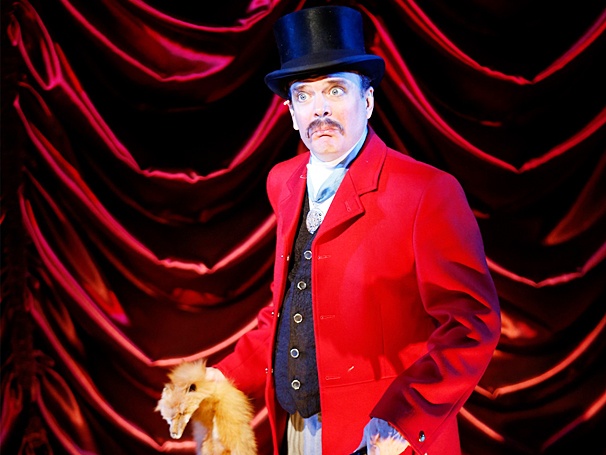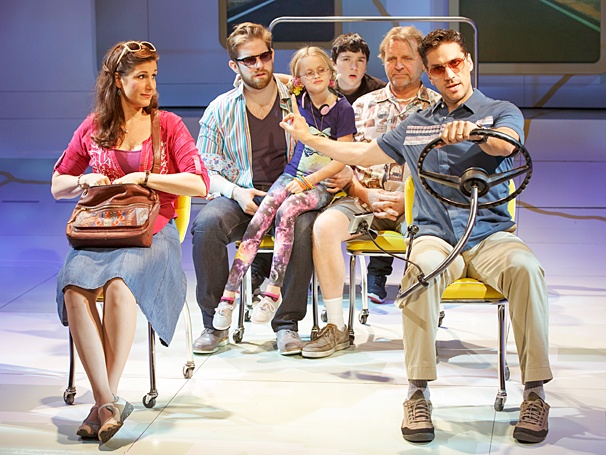Review: Natasha,
Pierre, & the Great Comet of 1812
 |
| Phillipa Soo makes a stunning Off-Broadway debut as the title character in Natasha, Pierre, & the Great Comet of 1812. Please let this be the start of many more star turns to come. |
Every so often a show comes along that is so thrillingly
original that it’s difficult to describe in words. Natasha,
Pierre, & the Great Comet of 1812 is just such a show, an incredible work
of art so unlike what has come before that it must be experienced firsthand to
be truly comprehended. A seamless fusion
of disparate and unexpected elements like Russian folk music, electronica, and
19th century literature that draws equally from the worlds of
musical theatre and traditional opera, Natasha
is a rollicking good time in the theatre and easily the best new musical of
the year.
The story is adapted from a portion of Leo Tolstoy’s famous
Russian epic War and Peace, but don’t
for a second let that fact fool you into thinking Natasha is some stuffy, overly romantic period musical. This self-described “electro-pop opera” makes
the source material feel fresh, vibrant, and immediately accessible, distilling the
passions and politics of the Russian aristocracy into something relatable to
modern audiences without losing an ounce of the setting’s otherworldly
appeal. The plot follows the young and
beautiful Natasha, who is madly in love with her fiancé Prince Andrey and goes
to live with her godmother in Moscow while anxiously awaiting his return from fighting
in the Napoleonic Wars. During Andrey’s
absence she meets and is eventually seduced by the indescribably handsome but
morally questionable Anatole, whose brother-in-law Pierre serves as the evening’s
narrator.
Through-composed with music and lyrics by Dave Malloy (who
also provided the libretto), Natasha features
an incredibly complex score that strikes the perfect balance between being
immediately tuneful and offering nuanced layers that require repeated listening
to fully appreciate. Staying away from
the more traditionally structured songs typically associated with musicals, Natasha’s score is heavily influenced by
the operatic model of melodically inventive recitative interspersed with more
rigidly formatted arias. Malloy creates
sonically distinct and vibrant worlds for each of the show’s varied settings,
from the rapturously beautiful cacophony of the opera to the thumping bass of
Moscow’s clubs. The blending of such
anachronistic and diametrically opposed genres only adds to the show’s unique identity,
and never once does a musical choice feel inappropriate or ill advised. Melodic motifs are subtly reused and
reconfigured throughout, making the show sound familiar and yet fresh for the
entirety of its runtime.
Malloy has written some truly stunning solos, like Natasha’s
soaring “No One Else” or her cousin Sonya’s plaintive “Sonya Alone.” Yet his true genius reveals itself in the
more complex duets and ensemble numbers, which are filled to the bursting point
with tight harmonies and elaborate choral writing. The multi-talented Malloy has also
orchestrated his own work to perfection, adding another dimension to the music
as the instruments and vocals intertwine in deliciously unexpected ways. But as beautiful and accomplished as Malloy’s
score is, it is always in service of the characters and the story, and it keeps
the show moving at a near-breathless pace.
Once the show starts, it doesn’t stop, and even the more introspective
moments carry with them a thrilling forward momentum. Malloy’s score lays the basis for this, but
it is amplified and enhanced by Rachel Chavkin’s stunning direction. Chavkin has gifted the show with an immersive
staging that truly makes the audience feel like they are a part of the action,
which occurs all around them in a specially designed venue called Kazino created
explicitly to house the show. The actors
enter and exit from all sides, often speaking directly to the audience and occasionally
roping a spectator or two into the action.
Chavkin’s artful deployment of her actors utilizes the space to its
fullest while at the same time maintaining a laser-like focus; you always know
exactly where you should look, but there is plenty to hold your attention
should you choose to glance elsewhere.
Further enhancing the show’s crystal clear storytelling is
the unbelievable lighting design by Bradley King. King achieves a dizzying number of looks and
washes over the course of the evening, highlighting and enhancing the action at
every turn. With just a couple of lights
and some colored gels King transports us to a snow-covered Moscow street at
night or an elaborate costumed ball in a palatial manor. King’s work is essential in creating some of
the evening’s most striking images, including a final tableau that beautifully
abstracts the titular Comet of 1812. It
is a virtuosic piece of design work that stands among the very best lighting
designs I’ve ever encountered.
And after all of this praise, I haven’t even touched upon
the extraordinarily gifted cast who brings this tale to life. The story is anchored, from beginning to end,
by Julliard graduate Phillipa Soo’s stunning portrayal of Natasha. Soo embodies Natasha’s youth and charisma while
utilizing a staggering emotional honesty and accessibility that makes you feel
every step of her journey from childhood innocence into full-grown
womanhood. Soo sings likes a dream and
has a remarkable amount of control over her voice, but it is her acting that truly
captures the audience and makes Natasha’s story involving, relatable, and
ultimately heartbreaking. Soo is a star
in the making, and one can only hope that Natasha
is the beginning of a long and illustrious career for the young beauty.
David Abeles is by necessity more restrained as Pierre, a
cuckolded husband and academic who spends a majority of the first act on the
story’s periphery. He possesses an
everyman quality that makes him feel approachable, and his expressive face and
voice allows him to communicate the multitude of emotions roiling beneath
Pierre’s stoic surface. As his
adulterous wife Helene, Amber Gray is an unbridled firebrand whose killer,
blues-influenced voice is put to particularly good use during the song “Charming.” And Grace McLean is outstanding as Marya D,
Natasha godmother and the grande dame of the Moscow aristocracy. A welcome bit of comic relief for most of the
show, McLean comes into her own during the impassioned one-two punch of “In My
House” and “A Call to Pierre” late in the second act.
The only cast member who isn’t quite all you’d hope is Lucas
Steele as Anatole. Undeniably handsome
and possessing an impressive tenor, Steele can be hard to understand when
singing in his middle register and lacks the emotional believability of his
costars. He has the character’s preening
physicality down pat, but doesn’t quite have the chemistry to truly sell
Anatole’s wholesale seduction of the innocent Natasha.
That is literally the only negative thing I have to say
about the production (and Steele is by no means awful); everything else is top
notch. Dave Malloy has written a truly
revolutionary score that deserves to be heard often and repeatedly, and may
well prove to be an inspiration to an entire generation of future musical
theatre composers. Rachel Chavkin has
directed the piece with precision and sensitivity, in an immersive
environmental staging that is a shining example of how such productions should
be done. The refreshingly multi-ethnic
cast is a top-notch group of singing actors, and Phillipa Soo in particular
establishes herself as an actress to watch.
Natasha, Pierre, & the Great
Comet of 1812 is playing a limited engagement through January 5th, so get
your tickets now or miss out on the most exciting new musical of the year.
UPDATE: The show has recently been extended to February 2nd, so you still have time to catch this gem! I'm already planning my (3rd) trip to this astonishing production.
UPDATE: The show has recently been extended to February 2nd, so you still have time to catch this gem! I'm already planning my (3rd) trip to this astonishing production.


